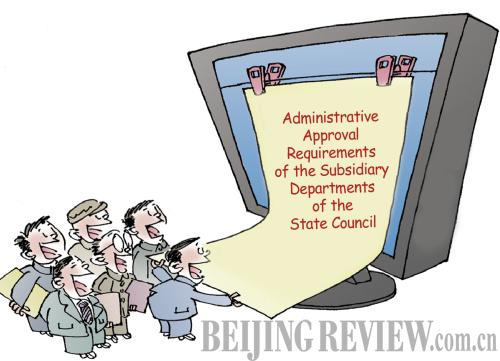|
 |
|
(JIANG YUEXIN) |
In a bid to boost transparency, China's central government departments have been ordered to make public their "power lists"—registers of administrative approval procedures.
According to a circular issued by the State Council, the country's cabinet, on February 20, all its subsidiary ministries, commissions and administrations are to publish their existing approval requirements on their official websites, so that they can be viewed by the general public.
The government should reform what and how it administrates, and central government departments will not be allowed to interfere in the approval of items not included in their own registers, the circular announced.
As of February 28, 54 of the State Council's 75 subsidiary departments had put their lists on their official websites' respective homepages. They also published telephone numbers for soliciting public opinions.
The departments now have a collective total of 1,143 administrative approval requirements. Among them, the State Administration of Taxation reports the highest number of items at 87, while some departments have retained only one, such as the State-owned Assets Supervision and the Administration Commission of the State Council.
The move to publicize the lists has won applause from the media as well as the public. Zhou Zhiren, a professor of public administration at Peking University, told Beijing Business Today that the greater transparency brought by the lists allows the public to supervise the government more effectively.
It will help "put power into a cage of regulations," said Dong Keyong, Dean of the School of Public Administration and Policy at the Beijing-based Renmin University of China, quoting words uttered by President Xi Jinping during a vow to fight corruption.
In the February 20 circular, government departments are required to solicit public opinions on further reductions of approval procedures.
Turning to the market
During his media debut as China's premier on March 17 last year, Li Keqiang vowed that the Central Government will cut its 1,700 administrative approval procedures by at least a third during its five-year term, which will end in 2018.
Li admitted that the administrative approval system in its current state had adversely affected efficiency and could possibly allow for corruption. "What society and the market can do well must be left to them. The government needs to manage the matters that fall under its supervision," he said.
According to a report delivered by Li to the Second Session of the National People's Congress, China's top legislature, on March 5, 416 administrative approval procedures were axed or otherwise delegated to lower-level governments by the State Council in the past year. He pledged to cancel or re-delegate an additional 200 plus requirements in 2014.
Also, the State Council announced in August last year that strict standards must be used in setting new approval requirements for products, investment by enterprises and qualification processes. At the same time, it restricted authorities from setting approval requirements in industries where the market can properly govern itself.
"The moves show that the government has relaxed control on sectors open to market competition," said Jin Linbo, Vice President of the National Academy of Economic Strategy at the Chinese Academy of Social Sciences.
On February 11, Premier Li again pledged to give more authority to the market on investment issues this year. He called on government departments to adopt a "negative list" approach in delegating powers and reducing administrative approval procedures. "The list should be formed according to the law to prevent any new requirements being added by local governments without proper legal procedures," he said at the State Council's second meeting on clean government.
The premier especially stressed the importance of facilitating investment, urging for "great determination" in reducing administrative approval procedures that may impede investors.
| 